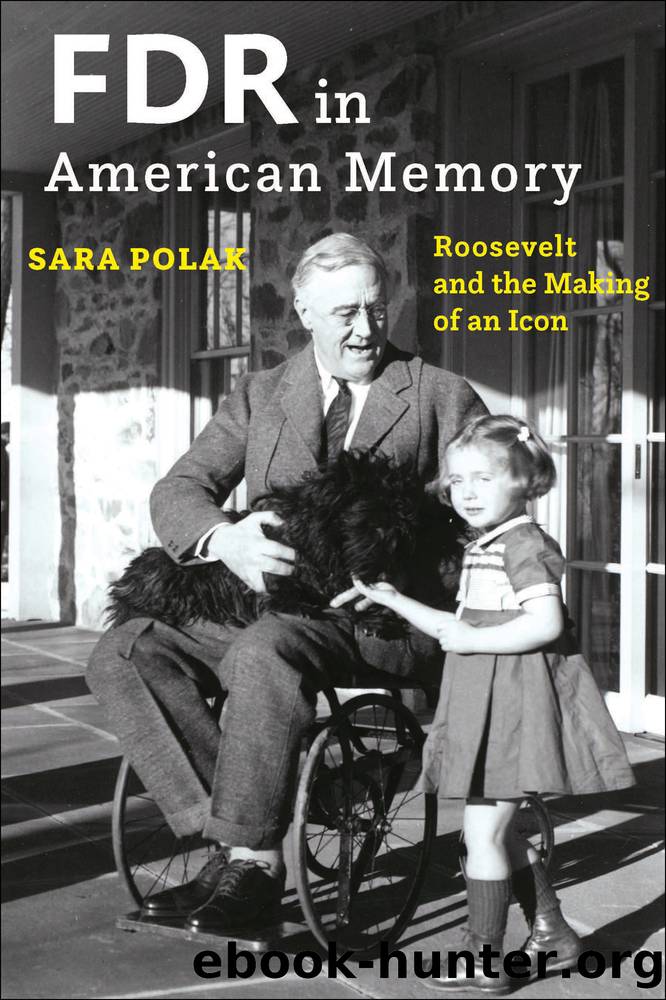FDR in American Memory by Sara Polak;

Author:Sara Polak;
Language: eng
Format: epub
Publisher: Johns Hopkins University Press
Published: 2021-12-15T00:00:00+00:00
This crudely sentimental scene obviously did not actually take place. This cinematic Franklin and Eleanor externally look dissimilar to the historical figures they represent. And there are no known cases of FDR bursting into song, using his power as commander in chief to get political opponents to join in, or demanding that he himself be allowed to sing a solo. Rooseveltâs Secretary of Commerce and New Dealer Harry Hopkins actually did once respond to an attack on the New Deal by saying, âPeople donât eat in the long run,â38 as FDR does here. But although the phrase is associated with the New Deal as an argument and a catchphrase, it is not Rooseveltâs.
However, many elements of this Roosevelt representation are strikingly faithful in one way or another to Rooseveltâs autofabricated public image. He famously claimed the role of commander in chief in peacetime, a role previously reserved for presidents during wartime only. This role brought him increased executive power during the Depression, although he did not in practice bypass Congress in making key decisions.39 FDRâs rhetoric casting the New Deal as a war against want, beginning in his first inaugural, has remained extremely influential. Later adaptations of this rhetoric have stressed the New Dealâs victory in restoring American morale, even if it was not overly successful economically. Roosevelt soon took the opportunity to link the New Deal to the threat of war and the survival of American democracy, saying on June 27, 1936: âHere in America we are waging a great and successful war. It is not alone a war against want and destitution and economic demoralization. It is more than that; it is a war for the survival of democracy.â
Such reasoning has taken attention off the memory of the New Dealâs economic problems and focused it on remembering its moral success, and following that, the success of the democratic United States in World War II. As Jonathan Alter has formulated it in his national bestseller, The Defining Moment: FDRâs Hundred Days and the Triumph of Hope: âThe first time he saved democracy, in 1933, he accomplished it more on his own, by convincing the American people that they should not give up on their system of government. Before he confronted fascism abroad, he blunted the potential of both fascism and communism at home.â40 Examples such as this one show how the New Deal has become depoliticized in mainstream American memory: attention moved away from controversial economic measures, toward much vaguer democratic and patriotic ideals that were harder to disagree with.
âTomorrow,â in all its vagueness about what exactly it is that will bring relief, equally exemplifies that shift of attention from the economic details of the New Deal to its triumph in saving American morale. The song offers restored confidence more than material relief, mirroring both the Republican stance at the time and the main remembered outcome of the New Deal. However, there was a difference between the Hooverian confidence in Emersonian rugged individualism and the New Dealâs social activism, as Alter notes: âThe result was a new notion of social obligation, especially in a crisis.
Download
This site does not store any files on its server. We only index and link to content provided by other sites. Please contact the content providers to delete copyright contents if any and email us, we'll remove relevant links or contents immediately.
Harry Potter and the Goblet Of Fire by J.K. Rowling(3165)
Never by Ken Follett(2964)
Unfinished: A Memoir by Priyanka Chopra Jonas(2945)
Machine Learning at Scale with H2O by Gregory Keys | David Whiting(2380)
The Man Who Died Twice by Richard Osman(2361)
Fairy Tale by Stephen King(2170)
Will by Will Smith(2128)
Rationality by Steven Pinker(1805)
The Storyteller by Dave Grohl(1699)
The Dawn of Everything: A New History of Humanity by David Graeber & David Wengrow(1630)
The Dark Hours by Michael Connelly(1617)
The Stranger in the Lifeboat by Mitch Albom(1599)
New Morning Mercies: A Daily Gospel Devotional by Paul David Tripp(1485)
Cloud Cuckoo Land by Anthony Doerr(1473)
Friends, Lovers, and the Big Terrible Thing by Matthew Perry(1395)
The Becoming by Nora Roberts(1372)
Crying in H Mart by Michelle Zauner(1369)
Einstein: His Life and Universe by Walter Isaacson(1352)
The Strength In Our Scars by Bianca Sparacino(1343)
